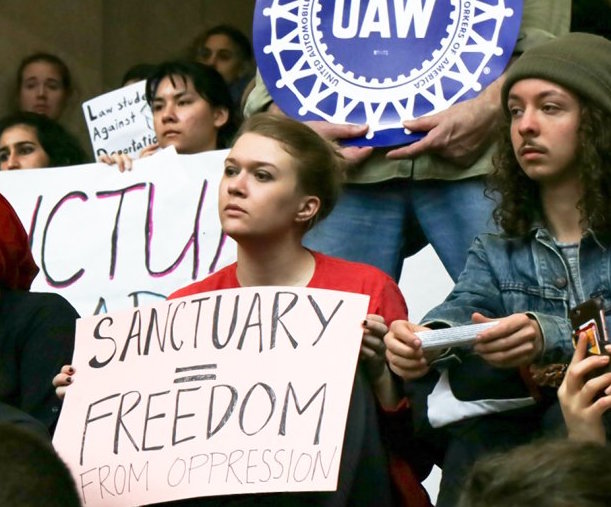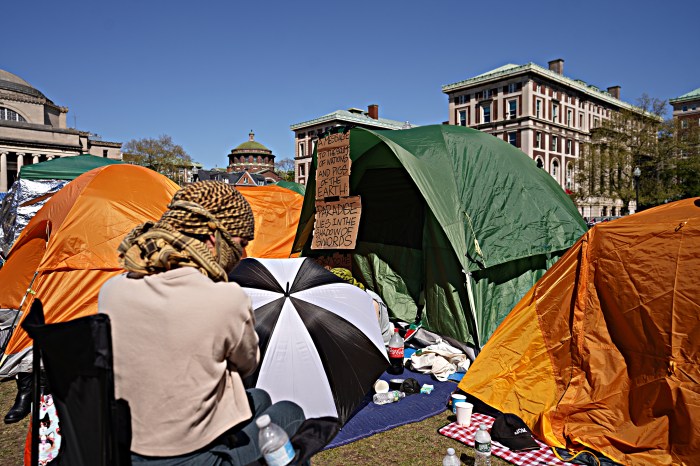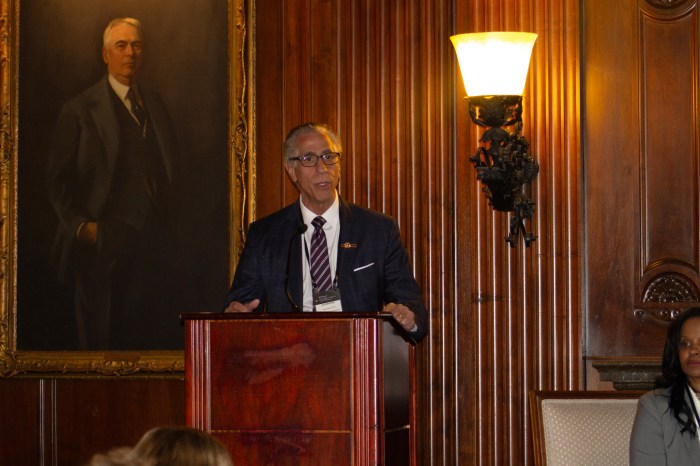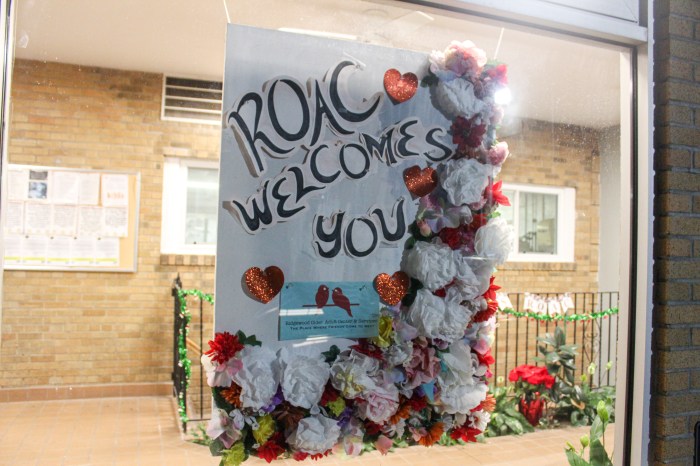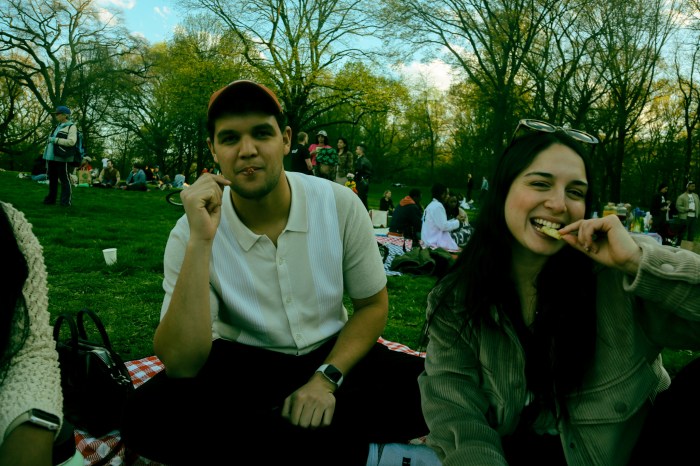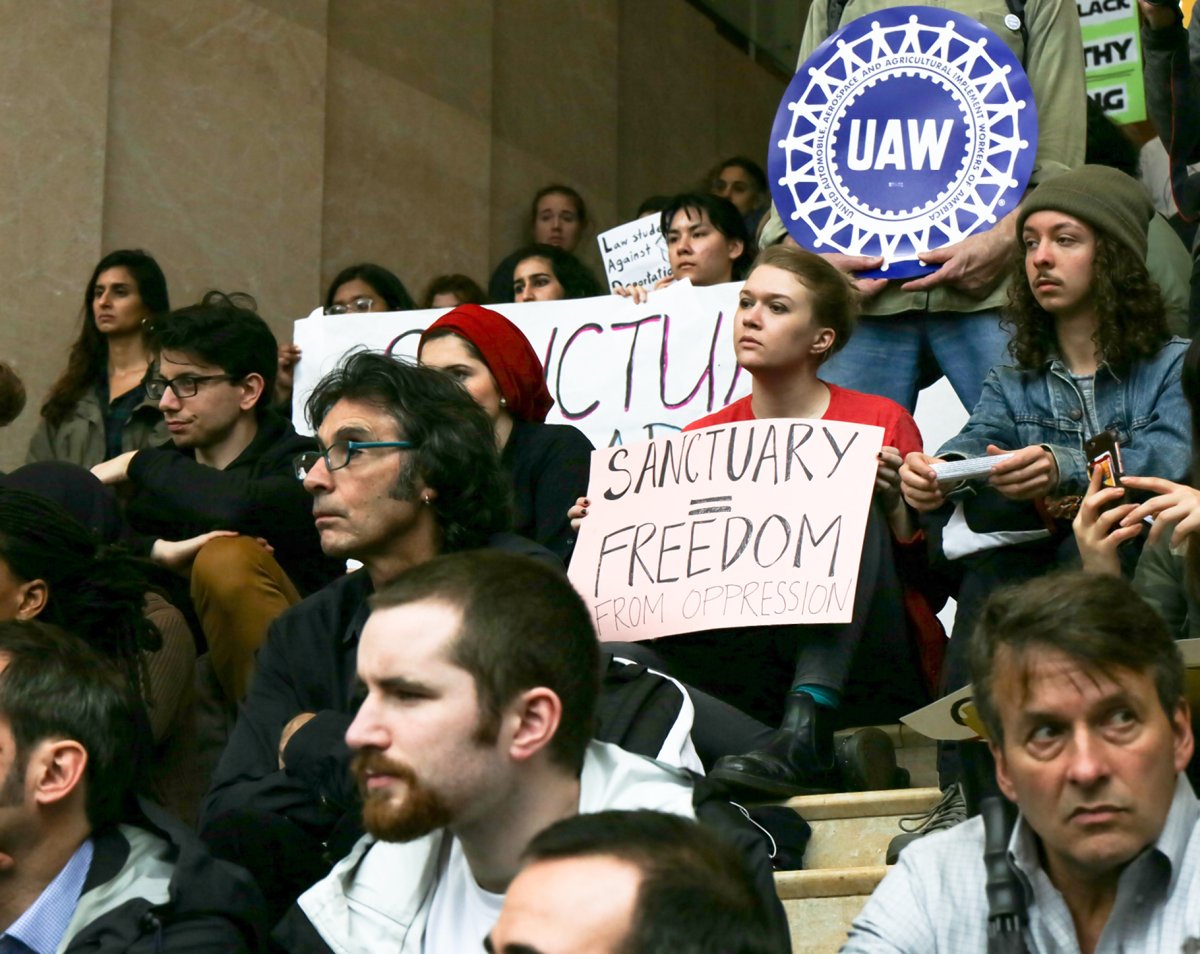
BY LINCOLN ANDERSON | New York University is facing a dire Donald Trump double whammy. On the one hand, many of its foreign Muslim students are feeling unsettled and confused amid the president’s “travel ban” on certain Muslim-majority countries. Meanwhile, undocumented students at N.Y.U. are racked with anxiety over the new president’s crackdown on immigrants. The two issues blur together into one big — orange-colored — ball of fear and loathing.
Trump released his so-called “Muslim Ban Lite” this past Monday, but — save for Iraqi students — it has done little to ease the panic that has gripped N.Y.U. students from the targeted countries ever since the president first issued the ban at the end of January. Trump’s new order dropped Iraq from the list because, the administration now says, it is an ally in the fight against ISIS and Al-Qaeda, plus adequately vets people traveling to the U.S.
At the same time, as Trump has vowed to deport millions of undocumented immigrants, debate also continues to swirl at N.Y.U. about whether it should become a so-called “sanctuary campus.” The school’s administration claims it’s a vaguely defined term, and that N.Y.U. already basically is committed to doing many of things that advocates are asking for.
Not satisfied with the administration’s answers, this past Sunday, N.Y.U. alumni staged a march on campus demanding that the school officially declare itself a sanctuary campus. Undergraduates similarly rallied a few days earlier. Another protest is set for this Thursday.
As for Trump’s “travel ban,” it has sent shockwaves of fear and confusion through N.Y.U., just as it has done at institutions of higher learning throughout the United States. As one of the nation’s largest private universities, N.Y.U. naturally has students from the six majority-Muslim countries — Iran, Syria, Libya, Sudan, Somalia and Yemen — that are included in Trump’s temporary ban. The policy is also impacting departments at N.Y.U. dealing with the Middle East — both in terms of which students the school should admit, as well as research trips abroad.
The new executive order affecting the Muslim countries is scheduled to take effect March 16. Suspension of visa processing for the six countries would be effective for 90 days, after which point “new procedures” would be enacted. The U.S. would also suspend accepting refugees worldwide for 120 days.
Trump’s first executive order was issued without warning at the end of January, sparking outraged protests at airports around the country. Along with Iraq, also dropped from the new order is any reference to prioritizing the acceptance of religious-minority refugees — i.e. Christians — from the now-six countries.
A Trump spokesperson said the countries were chosen because they are either state sponsors of terrorism or harbor terrorists. In turn, this Tuesday, the administration dropped its appeal of a federal court’s ruling that had blocked the first travel ban from going into effect.
Grilled at J.F.K.
Kiana Karimi was one of three N.Y.U. students detained — in her case, only relatively briefly — while trying to re-enter the country after Trump sprung his first travel ban on Jan. 27. An Iranian native, she has had dual citizenship for about two years and was traveling with her U.S. passport, yet was still held for questioning at J.F.K. She had been returning from visiting a fellow N.Y.U. student at his home in Egypt.
“I know how long it takes to get that document,” she said of her green card. “My parents applied for it when I was 6 in Iran. I got it last year — it took 24 years.”
Although the federal airport agents were “going by the passport,” in terms of checking most people, she noted, she was still grilled.
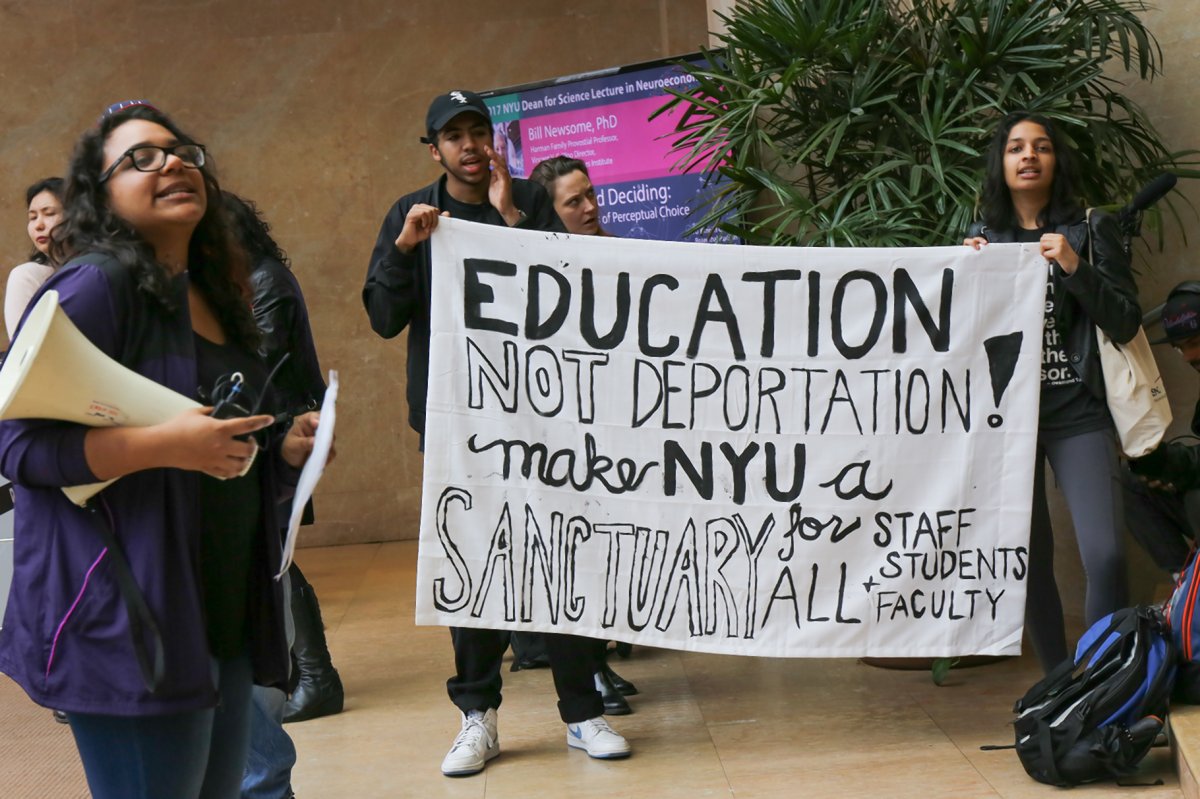
Writing for the London Review of Books’ LRB blog, she said, “When I got to the front of the queue, the officer told me the passport number they had in their records matched an old passport I had lost and their records were not updated with my new passport number. Therefore the passport I was traveling on was not valid. He admitted that it could be an error on their side, but I had to go for a secondary evaluation regardless. He handed my passport to another officer who accompanied me into a room packed with travelers who hadn’t been granted entry. … The line of U.S. citizens denied automatic entry were all, without exception, black and brown people who predominantly seemed Muslim.”
Under the revised executive order, green-card and visa holders are no longer included in the travel ban.
Karimi told The Villager the experience at J.F.K. left her shaken. The previous summer she had whisked through airport security with a simple electronic screening of her passport.
This time, however, she said, “I was asked by U.S. Customs and Border Protection about where I live, who I live with, what my job is. And I don’t know how my responses might affect me. We do not feel safe to travel.
“None of my Iranian and Muslim friends are traveling abroad,” she said, speaking shortly after the first travel ban was issued. “My friends who have a visa and green card are planning to stay here and not leave unless there is an urgent reason. Even among those with citizenship, it doesn’t sound wise to travel, because the minimum we might get is being questioned on the way back and detained, no matter how briefly, for interrogation.”
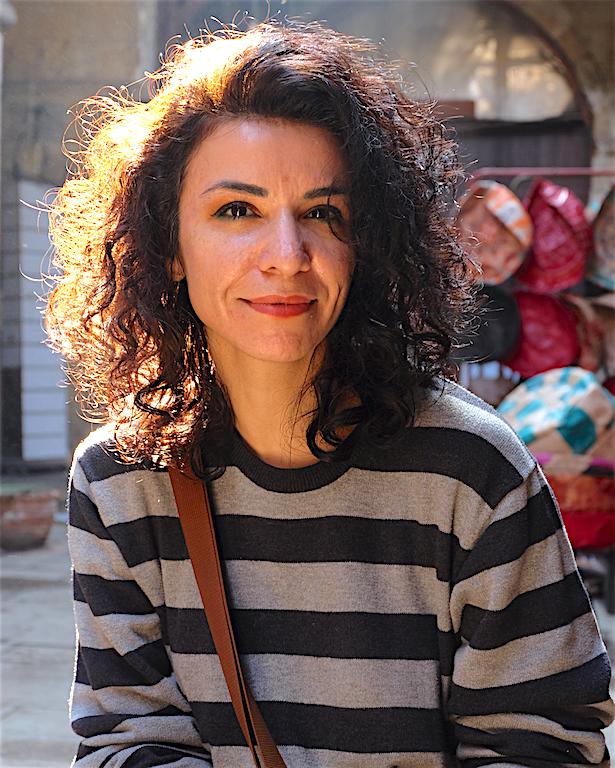
In that first initial flurry of confusion on Jan. 28, two other N.Y.U. students were detained at the Canadian border before being allowed re-entry into the U.S. One of them was Narges Bayani, a Ph.D. student at N.Y.U.’s Institute for the Study of the Ancient World. The university is not identifying the third student, and Karimi said she didn’t know who it was, either.
Escape from Iran
Karimi is a Ph.D. student in performance studies at the Tisch School of the Arts.
“My parents are both leftists,” she said. “My father has been in jail, both under the shah and under Khomeini. My parents did whatever they can so that we can live out of Iran,” she said of herself and a sibling.
Karimi is among those strongly calling for N.Y.U. to declare itself a sanctuary campus.
“President [Andrew] Hamilton and N.Y.U. say they are offering the equivalent of a sanctuary campus — but they’re not comfortable with the term,” she said. “But for me and other Muslim students this is important. I see President Hamilton hesitant to accept the title ‘sanctuary campus.’ ”
Karimi indicated that N.Y.U. is likely fearful of not only having to protect Muslim students, but also undocumented ones — those covered by DACA (Deferred Action for Childhood Arrivals) and DAPA (Deferred Action for Parents of Americans).
The refusal to embrace the “sanctuary campus” term, Karimi said, “tells me that the administration is not interested in accepting that level of support. They don’t want to be responsible.”
As for the travel ban, in general, she said, “There is a collective fear within the Iranian community about where this is going.”
She noted that many L.G.B.T. Iranians have fled to Turkey in hopes of then traveling on to the U.S. They can’t work or buy property in Turkey, she said, so Trump’s order has left them stranded in limbo.
N.Y.U. advisory
After Trump’s first executive order, N.Y.U. President Hamilton sent out an e-mail to students from the affected countries advising them to hold off on foreign travel, and directing them to resources for assistance. He also reportedly included students from Pakistan, since things were in flux and who really knew what Trump would do next?
N.Y.U. declined to disclose how many students received that e-mail from Hamilton. He issued a new advisory this week after the revised travel ban was released.
However, after the courts blocked the first travel ban, Karimi said some foreign students from the affected countries decided to travel during that window of opportunity, not knowing when it might close again.
Nick Mirzoef, a professor of media, culture and communication, said at-risk students had also been advised not to travel domestically.
“In effect,” he said, “students are stranded in New York, making it impossible for them to do research, attend conferences, let alone visit family or return home. This is a form of house arrest in all but name.”
N.Y.U. denied it had warned students about traveling domestically.
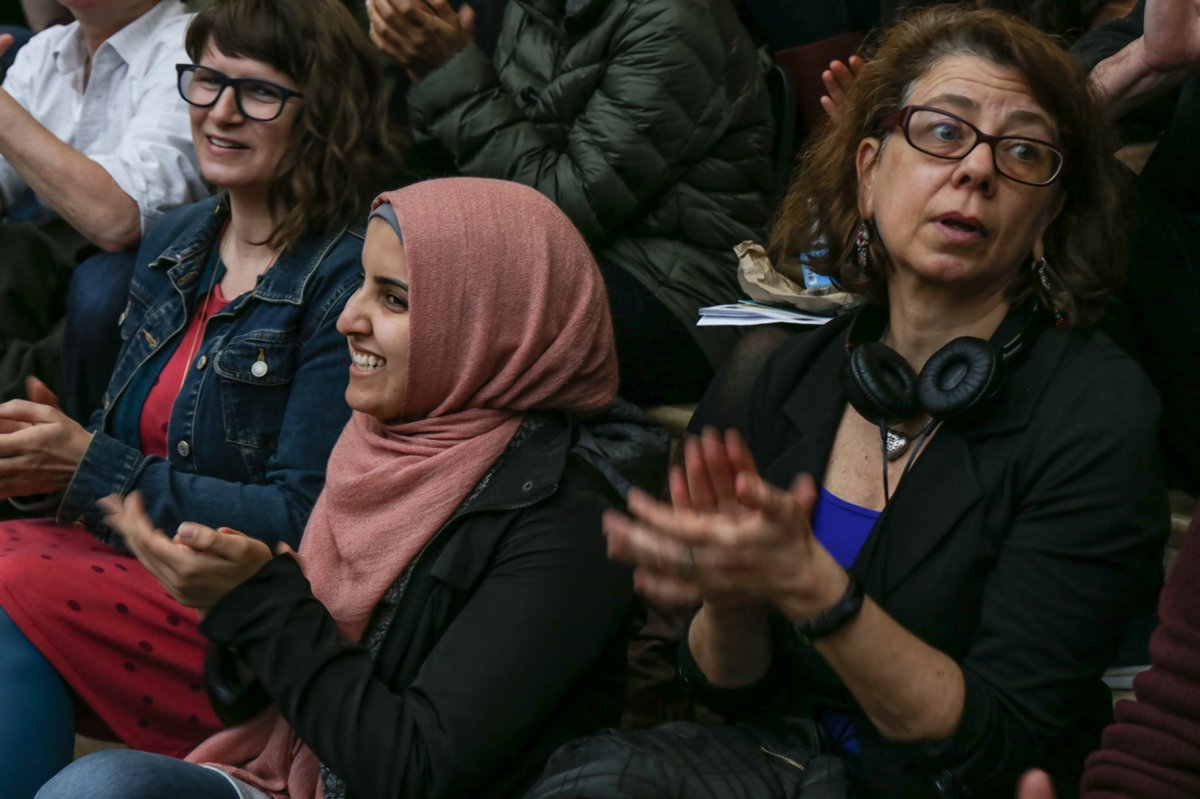
In addition, after the November presidential election, the N.Y.U. School of Law’s Immigrant Rights Clinic launched a new program, the N.Y.U. Immigrant Defense Initiative, whose mission is to “ensure free, confidential advice and representation to N.Y.U. staff and faculty at risk of deportation.”
Asked about the travel ban after the chaos at the airports on Jan. 28, Alina Das, a co-coordinator of the clinic, said, “The Muslim ban is unconstitutional and inhumane policy that is having a deep effect on communities that have long been a part of the U.S., and we are very proud to stand behind students and put an end to these policies.”
Paula Chakravartty, an N.Y.U. associate professor of media, culture and communication, is part of a group actively pressuring the university to do more to protect threatened students.
Sanctuary push
“We have an active faculty, student and staff coalition called the Sanctuary Working Group that has been working with affected students and pushing the university to change its position and declare itself a Sanctuary Campus,” Chakravartty said.
“Affected students are now in a state of limbo, given the turn of events. Students are worried about everything from funding and housing to status of their studies.
“I think the point here,” Chakravartty said, “really is why N.Y.U. is so determined to not sign on to sanctuary status, if, in fact, it claims to be doing ‘everything but.’
“The declaration of sanctuary campus is an expansive gesture and a proactive response — as opposed to responding to crises and executive orders as they emerge.”
Speaking after the first travel ban was issued, Zachary Lockman, an N.Y.U. professor of Middle Eastern and Islamic studies and of history, said it was causing havoc.
“Things are very much up in the air,” he said. “There are a number of applicants [from students hoping to attend N.Y.U.] from Iran. If they can’t get a visa… . There’s a lot of anxiety among the students.”
Order’s ironies
Lockman pointed out the ironies of Trump’s order.
“The U.S. has been the biggest outside influence in the Middle East since World War II,” he noted. “In Iraq, we destabilized the whole region and contributed to the civil war in Syria. We played a role in this whole catastrophe. And now to turn around and turn our back on people… .”
By contrast, he added, “We destroyed Vietnam and let huge numbers of Vietnamese in. Admittedly, there wasn’t terrorism then. This is slamming the door in the face of people whose lives we have messed up.”
He also derided as “arbitrary” the countries on Trump’s ban list. For example, Saudi Arabia — of which 15 of the 19 hijackers on 9/11 were citizens — notably was left off of it.
“Every administration since 1945 has been very supportive to Saudi Arabia,” Lockman noted. “We sell them arms and buy their oil. Their values are at odds with our country.” In general, he said, “The U.S. has propped up very nasty regimes for a long time.”
In Lockman’s view, the ulterior motive of Trump’s travel ban is pretty clear.
“I don’t think it has much to do with national security,” he said. “It’s sending a message to his base — it’s whipping up fears and pulling up the drawbridge.”
According to Chakravartty and other faculty and students calling for N.Y.U. to offer more protection, dozens of U.S. universities — more than 60, in fact, including Columbia, University of Pennsylvania, Rutgers and CUNY— have declared themselves sanctuary campuses. N.Y.U., for its part, denies that Columbia, for one, and others of the schools cited are, in fact, sanctuary campuses.
Defining the term
Specifically, a university being a sanctuary campus reportedly includes, to the fullest possible extent under the law, not voluntarily sharing information with Immigration and Customs Enforcement a.k.a. ICE, Customs and Border Protection or other federal agencies; not allowing ICE and other federal agents access to university buildings and property; instructing campus security to refuse to participate in actions by ICE and C.B.P. involving immigration enforcement, and prohibiting campus security from inquiring about or recording anything about students’ immigration status; and “distancing the university’s investments from anti-immigrant measures” by divesting from companies or funds that stand to profit from these measures, such as private prisons.
Asked for comment on Trump’s revised travel ban, N.Y.U. spokesperson John Beckman sent the following statement:
“Notwithstanding the recent changes to the executive order, the news about the federal government’s plans on immigrants is confounding and confusing. It has frightened many immigrants in the N.Y.U. community, and made all the rest of us concerned for their welfare.
“We are committed to doing everything we can within the law to protect our community members. N.Y.U. has announced a number of steps to protect at-risk immigrants in our community: Public Safety officers won’t ask about a student’s immigration status, and won’t share information with law enforcement; we will vigorously defend our students’ privacy rights; we will maintain scholarships for non-U.S. citizens, regardless of changes in immigration policy, and we will not share information about our students’ immigration status with federal officials, other than in the face of a lawful subpoena or similar order. There has also been a special Immigrants Defense Initiative launched at the N.Y.U. Law School to help those at risk.
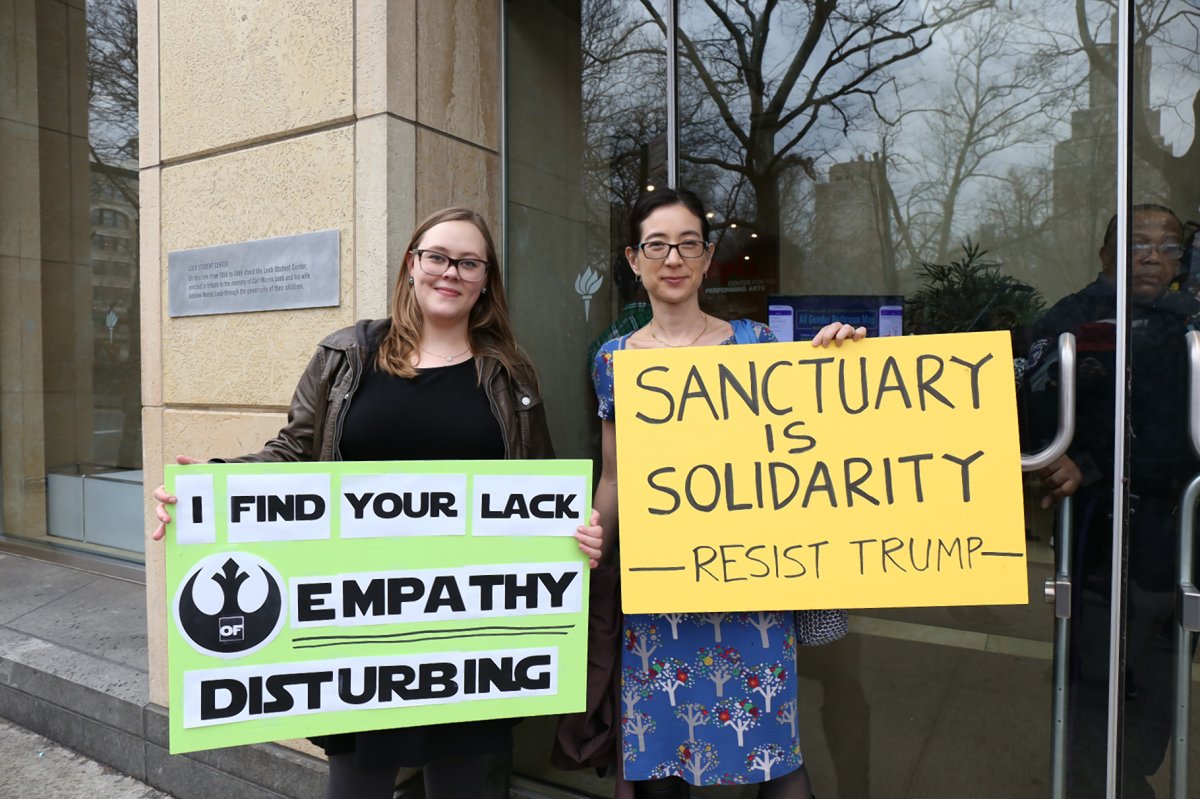
“N.Y.U. has not declared itself a sanctuary campus for the same reasons other major universities — Harvard, the University of California, Columbia, Princeton, the University of Chicago, Cornell, to name a few — have not: The term has no clear legal meaning; doing so would confer no greater protection on our community members; and doing so may do harm, because it may provide a degree of reassurance to our at-risk community members that the university cannot uphold.
“The bottom line is this: We are committed to doing everything we can within the law to protect our community members. We should not let an issue of terminology overshadow substance, or divide us at a time when we need to be united.”
Following Trump’s first travel ban, David Van Zandt, president of The New School, Greenwich Village’s other major university, issued a statement, hearkening back to the university’s roots. Apparently, no New School students were detained during the initial travel ban.
“The New School’s extensive international community is among our greatest strengths,” Van Zandt said in the statement. “A variety of cultural, political, ethnic, racial and religious perspectives — and diversity in all its forms — adds immeasurably to the level of our scholarship, creativity and ability to engage effectively with complex global issues. Further, in 1933, The New School founded the University in Exile, a safe haven for international scholars who were facing persecution in fascist Europe. That courageous and bold stance not only had a profound influence on U.S. scholarship, it also galvanized the core values that continue to define our university today.
‘Threatens mission’
“The executive order issued by President Trump threatens this educational mission,” Van Zandt said. “The open exchange of ideas — across disciplines, geographic borders and political boundaries — is vital to the continued growth of scholarship and creativity worldwide. We will do everything within our power to support them.”
On Nov. 29, The New School’s board of trustees passed a resolution underscoring the university’s “commitment to creating a safe environment” for its students to pursue their studies, and reaffirming its identity as an inclusive community that stands for social justice.
“We will continue to act consistently with that resolution,” Van Zandt pledged. “We are also working with other colleges and universities to share information and discuss strategies to demonstrate our collective strength.”



